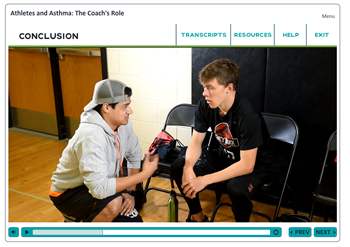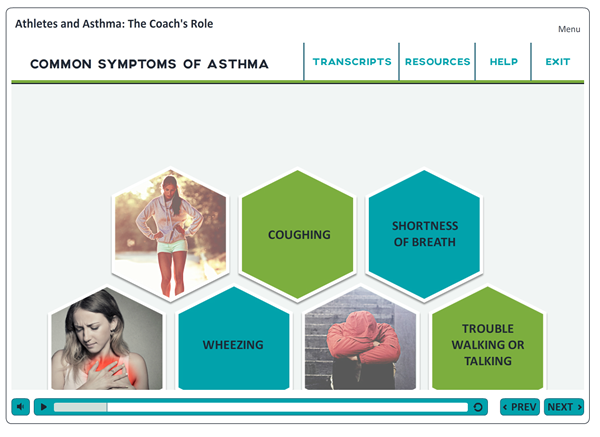Asthma
- Asthma Home
- About Asthma
- Managing Asthma
- Data
- For Schools
- For Health Care Professionals
- For Homes
- For Communities
- For Workplaces
- Who We Are
- COVID-19 and Asthma
Resources
- Outdoor Air Quality Guidance for Schools and Child Care
- Asthma Home-Based Services Toolkit, Manual and Client Curriculum
- Athletes and Asthma: The Community Coach's Role
- Asthma Education Resources for American Indian Communities
- Asthma Home-Based Services
- RETA - Reducing Triggers in the Home Training
- Strategic Framework 2021-2030
Related Sites
Minnesota High School Coaches Asthma Training
Minnesota State High School League (MSHSL) and the Asthma Program
 A slow fade from complete black to looking down at an athlete’s shoes; standing still on the gym floor. The image is greyed around the edges. This is the view of his own feet and his vision is edging in and out as his breathing worsens; his breathing becomes more labored with a wheeze and a high pitched cough. Then a voice says….” Jacob are you alright…. (pause)…. JACOB!”
A slow fade from complete black to looking down at an athlete’s shoes; standing still on the gym floor. The image is greyed around the edges. This is the view of his own feet and his vision is edging in and out as his breathing worsens; his breathing becomes more labored with a wheeze and a high pitched cough. Then a voice says….” Jacob are you alright…. (pause)…. JACOB!”
The text on the computer screen says this is an Asthma Attack, then rolls to the text,’ Asthma is one of the most common chronic diseases in the United States’, and then ‘24.6 million Americans have asthma including an estimated 6.2 million children’. The final text says” What would you do if this were your student?”
This new training, called “Athletes and Asthma: The Coach's Role, launched on July 1, 2017, gives Minnesota high school coaches the training they need to support athletes who have asthma to compete safely. Currently, 23,495 Minnesota High School coaches have completed the training to date.
Leveraging partnerships and technology
This online training module, developed with expertise from the MSHSL, Minnesota Department of Health Asthma staff and an eLearning Design and Development company, guides coaches through their own learning experience using simple and advanced animation, video and interactive questions. Coaches learn about athletes and asthma through scenarios that mimic the real-life decisions they may face during practice and competitive events.
The training module includes:
- The prevalence of asthma in student athletes.
- The basic definition of asthma.
- How asthma affects student athletes and the importance of controlling asthma.
- Potential asthma triggers and how to identify them (e.g. environmental, exercise).
- The symptoms of asthma or an asthma attack.
- Appropriate action to take when an athlete experiences an asthma-related event.
- Appropriate prevention methods for athletes to take and coaches to encourage
- Final 10 question quiz for coaches to complete and pass to receive credit for module.

The 23-minute online module is required training for the 22,000 Minnesota high school coaches and will be active and available for three years (until July 1, 2020) within the three-year continuing education requirement (CER) cycle. The current CER modules include: Asthma Module, Concussion Module, WHY WE PLAY Module and Anyone Can Save a Life.
Only league member schools and their coaches can access the asthma module using the league's secure password protected coaches portal on the MSHSL website.
What the data tells us about asthma
Asthma is a chronic disease causing airway swelling and hyper-responsiveness to triggers, mucus production, and tightening of the muscles around the airways.
- An estimated 393,000 Minnesota children and adults have asthma.
- In 2015 there were 61 deaths related to asthma, and two were under the age of 18.
- In 2014 there were 21,800 emergency department visits and 3,400 hospitalizations for asthma across Minnesota.
Asthma and sports
- The 2016 Minnesota Student Survey found that 58 percent of Minnesota, middle and high school youth who have asthma compete in club, community and school sports teams, compared to 57 percent of youth who don't have asthma.
- Among those who participate, one in six young athletes have been diagnosed with asthma. This means three members on a team of 20 are likely to have asthma.
If not well controlled, asthma can affect academic performance and can prevent students from participating in school activities including sports. While asthma is a chronic disease that, at this time, cannot be cured, it can be well controlled with appropriate medical management and by minimizing exposure to things that can trigger asthma symptoms.
State and National Media Coverage
- Minnesota -KARE 11
- Minnesota Spokesman-Recorder: All Minnesota high school coaches required to take asthma training
- Twin Cities Agenda: Asthma response training: Keeping kids safe
- USA TODAY - High School Sports
Learn more about asthma
State
- Minnesota Department of Health Asthma Resources in Schools
- Minnesota Department of Health Asthma Sports Posters
National
- US Centers for Disease Control and Prevention – Asthma in Schools
- US Environmental Protection Agency - Asthma
For more information:
Contact Kelly Raatz, Asthma Communications and Program Planner, Minnesota Department of Health kelly.raatz@state.mn.us.